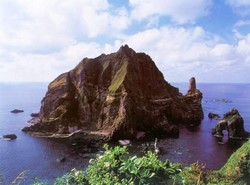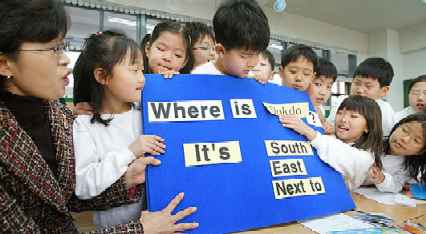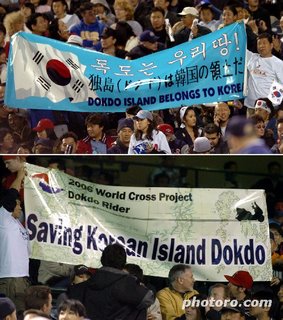What happend to Liancourt islands in 1952
 You heard about the news?
You heard about the news?Japan has an everlasting territory issue with South Korea; the island, "Takeshima"("Dokdo" in Korea), in which no one can live because of the size, is a big concern since both countries mainly feed themselves on marine foods.
Koizumi and his cabinet members seem to have silently plotted to make Japanese opinion patriotic who are much less so than Korean. This is a very clever idea Koizumi came up with because if you trace back the history of the island, you are going to find many violations of international laws conducted by South Korea, and you'll find that it should have belonged to Japan. It's a matter of time before Japanese people start to think of Korea as a frequent law breaker.
Too much patriotism
Hearing the news of Japan's maritime survey near the ilsand, which is legal, Korea's backlash against Japan's government can't be avoided. But this backlash may be seen without Koizumi if you are a careful Korean watcher.

The pic above was taken in a class room in Korea where a teacher is using a board and try to have the pupils learn an English sentence, "Where is Dokdo?" The pupils look only 10 years old! That way, the whole Korea instills young children who are going to be strong patriots. Have you ever seen any Korean? They are VERY VERY patriotic, being proud of Korean. Is Japan getting rightish? NO! KOREA is the baddest rightist.
Sometimes they don't forget to appeal for their claim. Look at the pic below. He's apparently a soccer player and he writes "Dokdo is ours" in his T-shirt. Looks like he scored and took off his uniform.

Next pic below is from an international baseball game. It's now apparent since it's written in English. Eww, let's just calm down and forget about territories in a sport match!

What I just don't understand is the fact that Korean have been occupying the island and they are such a yeller. You don't have to shout about your purse being yours because you are the legitimate owner and you know it.
If you run a search in Wikipedia for Liancourt Rocks which is another name for Takeshima(Dokdo). It writes that "Syngman Rhee's (Peace Line) declaration of January 18, 1952, included the Liancourt Rocks as Korean territory," which is correct. But there's an unknown fact most of Japanese and Korean people probably don't know: this declaration was taken place, followed by invasion of Korean military into the surrounding area with a seizure of 3929 Japanese casualties, 2 killed, and 300 captured fishing ships. The custody of Japanese people in Korea was for advantageous negotiation for a peace treaty between South Korea and Japan. The detention lasted for 13 years until 1965. As a result of the peace treaty, South Korea succeeded in acquiring more than twice of its national budget.
The reason of ignorances of this incident up until now varies from South Korea and Japan. South Korea just don't have to acknowledge the dark side of the regime, simple and natural. And for Japanese side, the general atmosphere after WWII that Japan troubled South Korea in the war time made them hesitate to designate the crime of them. Japan also feared that accusation against South Korea may raise deplomatic military tensions between the two countries.


4 Comments:
AT 23, Jason McGuinness lives a postcollege life in Manhattan that is very nearly typical. He works as a media research analyst, making about $30,000 a year. Sharing a two-bedroom apartment on the fourth floor of a walk-up building with a roommate on the Upper East Side, his portion of the rent is $1,100 monthly.
Skip to next paragraph
Marvi Lacar for The New York Times
Jason McGuinness, 23, in his New York apartment with his mother, Gail Horowitz. Ms. Horowitz sends him a monthly check for $300 and picks up his cellphone bill.
The walls are decorated with pennants and posters from Syracuse University, his alma mater. He orders takeout dinners, carries peanut-butter sandwiches to work and occasionally takes in a Mets game with friends.
And like many of his peers — educated, employed, urban-dwelling young adults — he receives monthly assistance from his parents, in the form of a $300 check and the payment of his cellphone bill.
This is not the largesse of wealthy families doled out through trust funds. Nor is the money a couple of $20 bills tucked into a card at the holidays. Mr. McGuinness and others like him are the beneficiaries of an increasingly common subsidy arriving regularly from Mom and Dad, something like a family fellowship.
It helps to pay for housing, bills and travel expenses, and the support has been increasing for the past two decades as education is extended, marriage is delayed and young people take the scenic route from adolescence to adulthood.
"Everybody I know is supporting their children in some way," said Gail Horowitz, Mr. McGuinness's mother, a vice president of the Zlokower Company, a public relations firm in Manhattan. Unlike young adults who "boomerang" back home to live with their parents — the subject of the recent comedy "Failure to Launch" — these young people live independently. But they need help to make ends meet, or put another way, to maintain a middle-class way of life.
The bottom line is that the assumption that financial obligations to children ended after graduation from high school or college is going the way of the pay phone. Today, parents are finding that they are on the hook for more, sometimes much more — contributions of thousands of dollars a year to help young men and women get on their feet economically, often into their 30's.
The economic dilemmas facing young adults were chronicled in two recent books: "Generation Debt" by Anya Kamenetz and "Strapped: Why America's 20- and 30-Somethings Can't Get Ahead," by Tamara Draut. Both explore how paychecks have stalled, housing costs have risen, education costs have skyrocketed and credit has become so available as to be dangerous.
Ms. Draut, the director of the economic opportunity program at Demos, a New York think tank, said students now leave college with an average of $20,000 in loans, which "added to these flat-lined paychecks and high costs of living, tips people over the edge."
While economic stresses may be exacerbated in cities like New York, people in other areas of the country are feeling the pressures as well. Nationally, 34 percent of those between 18 and 34 receive cash from their parents annually, according to a study by the Institute of Social Research at the University of Michigan published in "On the Frontier of Adulthood" in 2005. Cash is only part of the picture; parents also make generous presents of clothes, cars and help with down payments.
"We have not seen any signs of it decreasing," said Bob Schoeni, an associate professor of economics and public policy at the University of Michigan, who is an author of the study. "Certainly over the last couple of decades it has been increasing."
Middle-income parents earning less than $72,600 a year can expect to spend $190,980 on a child through age 17, according to 2005 government statistics. But Dr. Schoeni said that parents can plan on paying almost 25 percent of that amount again over the next 17 years, or $42,280 in 2005 dollars. This sum includes higher education but also much more.
Parents pay $2,323 a year to help support children 25 and 26 years old, said Dr. Schoeni, and $1,556 annually for offspring 33 and 34. (All amounts are in 2001 dollars and reflect support to children living both independently and at home.)
Nearly half of children between 18 and 34 also receive aid in the form of their parents' time — driving them home to the city after a visit, doing laundry, taking care of grandchildren — that has financial value. Time assistance from parents averages about 367 hours a year, or nine weeks of full-time work.
Rhis has nothing to do with korea wtf dogg
They have already occupied the island. They don't have to run a risk.
The underwear is not gonna sell itself.
I finally found a web about Takeshima written in English. Thanks for this information :)
I would you like to emphasis how "Syngman Rhee's (Peace Line)" made by Korean President Lee Seung-man. He suddenly declared unilateral ocean rights (the Lee Line Declaration) without asking any opinion from Japan and announced that Takeshima was included within the Lee Line.
I hope this info help more understanding for people in the world.
Post a Comment
Subscribe to Post Comments [Atom]
<< Home